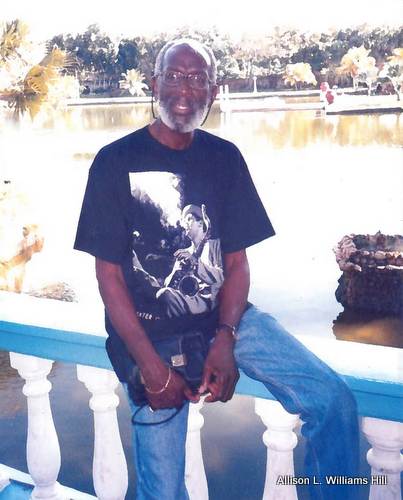Caregiver
You Are Equally Important
Part I

aregivers have one thing in common because they are taking care of someone else in need. Baroness Pitkeathley, author of It's My Duty Isn't it? defined a
caregiver as “…someone whose life is in some way restricted by the need to be
responsible for the care of someone who is mentally ill or handicapped,
physically disabled or whose health is impaired by sickness or old age.” More people are becoming disabled in their later years.

"Spirit of the Island I" by Allison L. Williams Hill
Informal caregivers are caregivers who are unpaid. According
to the Federal Government Source for Women’s Health Information, over
60% of the nation’s informal, or unpaid, caregivers are women and 13%
are 65 years and older. Male
caregivers are increasing in number.
Though male and female caregivers experience stress, exhaustion,
depression, and reduced personal time, men approach caregiving differently in
that they see it as a series of tasks, they delegate, and they ask for help. hey are taking care of
approximately 44 million Americans.
As the range of care varies, so does the age and abilities of the caregivers. They could be:
- parents with physically challenged children;
- parents or relatives with children who are mentally challenged or cannot survive on their own, or a child with both physical and mental challenges;
- children of aging parents experiencing physical or mental challenges, or both, or
- spouses taking care of a loved one.

The Goddess Within by Allison L. Williams Hill
Caregiver Stress
Parents, baby boomers, wives, husbands, and single mothers experience stress. Add to that many caregivers work outside the home and may need to for financial reasons. Any of the following or a combination of ways stress is experienced can throw their lives out of balance because of the set of circumstances they face such as:
- frustration;
- anger;
- guilt for being angry or frustrated;
- loneliness, and
- exhaustion.
We all handle stress differently. Personally, I have been a caregiver for several years. My husband experienced a myriad of medical conditions beginning with sciatica and now, dementia and depression. My husband is not completely aware of what is happening to his body and his brain, that he can actually describe it. He knows that his ability to think and his command of speech are changing. He earned his doctoral degree about six years ago and struggles to sustain that level of critical thinking. His focus had always been to help others.
Hours
I would leave the house and use more than 8 hours each work day at a foreign government’s planning physical department experiencing stress in producing a study, for example, that we understood we had three months to complete, reduced to two weeks. I would work at home during early morning hours on a laptop next to my sleeping husband.

Husband Clement Edwardo Hill, II
Clem, you still are my birthday gift. 4/23/2024
I
would make my husband’s lunch and leave it in the refrigerator for him
to have in the afternoon. Eventually, I returned home in the early
evening to find his lunch still in the refrigerator. “I forgot,” he’d
say. I’d remind him several times during the evening and at breakfast. I
returned from work to find his lunch in the refrigerator. Thereafter, I
drove home to give him his lunch. I drove back to work to consume mine
in front of the computer.

Signs
As time went on, I felt I would rather eat with him at home and make up the time at the end of the day. A friend of my husband, for whom I was designing a home, came to the office and asked how he was doing. I was telling him how things were progressing while searching for work on the computer and began to cry. I could not stop. I was fortunate that I was in an enclosed office. I strongly resented his asking. When I calmed down several minutes later after he’d gone, I realized how much I used that job as a substitute to block out what was happening at home. But I only traded one type of stress for another.
About a year and a half ago, I resigned to remain at home full time. After two weeks of being at home around my husband, watching all that he did, I felt I should have resigned sooner.
Signs that stress have become too much are when one experiences:
- feeling overwhelmed;
- inadequate sleep- either too much or too little affects serotonin levels which is responsible for one’s well-being;
- weight fluctuation;
- fatigue, occurs unpredictably at all hours of the day and night;
- lack of interest in activities one enjoys;
- short tempered;
- constant worry;
- sadness;
- physical pain, and
- alcohol or drug abuse to numb and escape.

Caregivers
generally need to take care of themselves because they are serving two
people - husband, wife, sister, aunt, parent, grandparent, or child and
themselves. In another article on health and well-being, I offer
solutions that help caregivers gain strength in their lives.
To begin, ask yourself if you, or ask someone you trust if they
recognize signs of stress in you. Be open to hear, receive and be kind
to yourself as you resolve to address your needs. It will take time for
you to lovingly attend to the one in your care and to consciously
attend to you.
Caregiver and the Receiver
My husband earned several degrees in his career. He said he would never stop learning, and knowing that about him made what I witnessed appear as jokes. He was having fun. This wasn't serious at all. His mind, however, was turning into something he did not know. He was forgetting things. His personal hygiene stopped. We took care of ourselves. I watched him periodically, but it was not to memorize what he did. It was to gauge his use of time when we had appointments.
How did he feel when what he knew changed and he was not going to get his way of being back again? It was moving away in chunks and slivers. I was more concerned about being cautious in identifying what was going on rather than attempting to put myself in his shoes. I thought he was joking. He retired from the college. He was chillin'.
How does it feel to forget almost everything you know? Breathing was automatic, thankfully. Otherwise he might have forgotten that also. It feels as if you are thrown into the wind, but oddly, gravity is in play.
Links

The above meditation mandala will be available soon.


















